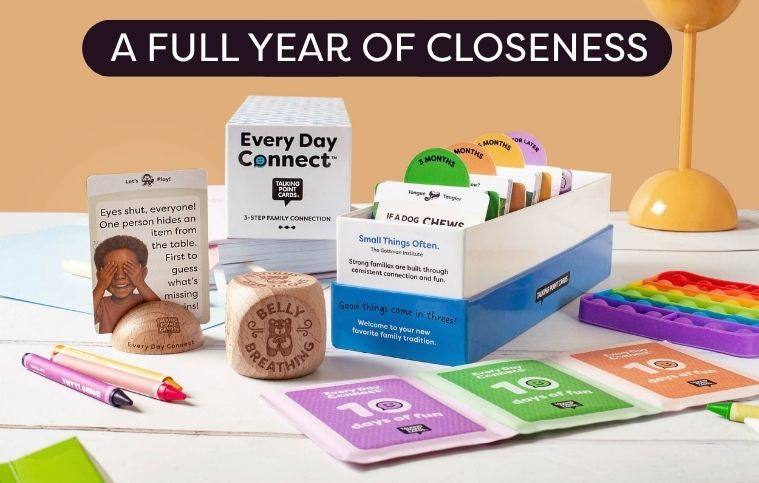SHOP
About
Teaching Kids the Art of Conversation
Why It's Important and How to Do It

When was the last time you had a real, unbroken conversation?
Like, the kind where you were forced to communicate entirely through the spoken word - with no escapes to phones or digital screens when things got awkward?
If you're racking your brain trying to remember, that's totally normal. The art of conversation is becoming a lost art in the digital age. It's one of those social skills that can feel antiquated and unnecessary in 2024 when we have so many other communication tools at our disposal.
But here's the thing: Having strong conversation abilities is kind of a big deal. Like, they'll actually make your kids' lives way easier in the long run.
That's because conversations are the currency of human interaction. They're the scaffolding that real, lasting relationships are built upon. And those relationships are what make humans...well, human.
So if we want to raise kids who can develop deep friendships, succeed professionally, and become kind and empathetic adults, we need to equip them with elite conversational skills from an early age.
And that's exactly what this article will teach you how to do.
Let's get into it:
Why Kids Need to Learn Conversation Skills

Learning conversation skills is like downloading the operating system for human interaction into your child's brain. It gives them the fundamental code to communicate with others in a healthy way.
Without that core programming installed early on, your kid may face some obstacles later in life, like:
Trouble making and keeping friends
Ever notice how the kid who can string a few cogent sentences together in the schoolyard tends to be more popular than the one who just grunts incoherently? Practicing conversation helps kids relate to their peers, build rapport, and form strong social bonds.
Difficulty with emotional intelligence
Engaging in back-and-forth exchanges is how kids learn to perceive subtle emotional cues from others—an essential ingredient for developing empathy. The more conversational practice they get, the better their emotional awareness becomes.
Struggles in professional settings
You know those insanely awkward interview moments when the candidate just kind of...freezes up? A lifetime of skipping out on conversation practice can lead to cringe-y scenarios like these. Nobody wants their kid to be that person.
Anxiety in unfamiliar social settings
Going to a party where you don't know anyone is pretty much a nightmarish hellscape for the conversationally impaired. Talking to new people cold can feel paralyzing if you don't have the proper experience under your belt.
So in both their personal and professional lives, kids who were never taught conversational skills often face roadblocks that could easily be avoided. And those roadblocks tend to be pretty anxiety-provoking and psychologically taxing.
By making conversation practice a priority early on, you're equipping your child with the tools to confidently navigate all the social waters that lie ahead. It's a skill that reduces friction in pretty much every facet of life involving other humans.
Which is a pretty huge chunk of life.

How to Teach Conversations to Kids
Okay, so we've established that conversational abilities are essential life skills every child should learn. Now for the good stuff: how do you actually go about teaching this?
Well, like most worthwhile pursuits, it takes patience, consistency, and the proper technique. Here are some effective tips and principles to get started:
Model good conversational behavior
Kids are naturally amazing at mirroring the behavior of those around them. If you want your child to become a conversation Jedi master, you need to be one yourself.
That means:
-
Maintaining eye contact during exchanges (no phone peeking!)
-
Asking follow-up questions to keep conversations flowing
-
Using thoughtful vocal inflections and hand gestures
-
Regulating your interruptions and allowing room for others to speak
-
The more you exemplify these polite conversational principles, the more second-nature they'll become for your little ones.
Use the art of questioning
Good conversationalists are professional askers of questions. That's because open-ended questions are the engines that move discussions forward in a meaningful way.
So get your kids accustomed to asking each other things like:
-
"What was the best part of your day today?"
-
"If you could go anywhere in the world, where would you go?"
-
"What do you think the world will be like in 20 years?"
These kinds of open-ended questions require more substantive answers than a simple "yes" or "no." Over time, your kids' brains will get better at formulating responses that draw from real thoughts, opinions, and imagination—a core conversational muscle.
Practice conversational turn-taking
This one is huge. Way too many conversations fall apart because people neglect to take turns and just kind of word-vomit over each other repeatedly (much to the annoyance of everyone involved.)
So teach your kids the core principle of conversational turn-taking: When someone is speaking, everyone else needs to listen. Only once they're finished can someone else take their turn to make a relevant point or ask a follow-up question.
Putting this into practice at home will ensure your kids' brainwaves learn the rhythm of respectful turn-taking. It may feel a little rigid at first, but it's a key skill for having smooth conversations with others.
Do low-stakes role-playing
Role-playing different scenarios gives kids a low-pressure environment to practice conversational dynamics and get comfortable speaking their minds.
For example, you could do role-plays where they have to:
-
Introduce themselves to someone at a party
-
Discuss their favorite movie with a friend
-
Resolve an imaginary conflict with a classmate
The more informal role-playing practice they get, the less daunting real-life conversations will feel.
Reward good conversational behavior
Both kids and adults respond extremely well to positive reinforcement. Let your kids know when they demonstrate particularly strong conversational skills—be it by making eye contact, asking an insightful question, or politely taking turns.
You can praise them in the moment, build up a token economy system, or find creative ways to incentivize the behavior you want to see more of. Positively reinforce those good conversational habits until they become second nature.
Set clear expectations
Kids need firm boundaries then it comes to learning most skills, and conversation is no exception.
Set clear expectations around respectful conversational etiquette, like:
-
No interrupting when others are speaking
-
No abrupt conversation topic changes without a transition
-
No incessant fidgeting or looking away during exchanges
Having these standards in place provides a structured framework for kids to gradually improve their conversational talents.
Schedule conversational practice time
Consistent practice is key for any skill to properly solidify. That's why you should schedule regular "conversational practice sessions" with your kids—times of the day when all digital devices get left behind and your full attention gets devoted to simply talking with each other.
Car rides, walks around the neighborhood, or mealtimes are all perfect opportunities to engage in some unplugged conversational practice.
Within reason, avoid reprimanding them for awkward silences or stumbles during these sessions. The goal is to simply create a judgment-free space where they can gain experience flexing their conversational muscles.
Preparing Kids for a Conversation-Centric Future

The better conversational skills kids develop now, the more successful and joyful they'll tend to be later in life. That's just a fact.
Here in 2024, we live in a high-tech world that seems to become more hyper-connected and fast-paced by the day. And yet, oddly enough, basic face-to-face communication skills sometimes feel like they're going extinct.
By teaching your kids the art of conversation from a young age, you're investing in their ability to:
-
Build deep relationships that provide joy, comfort, and fulfillment
-
Understand others' perspectives and emotional states with nuance
-
Convey ideas confidently in both personal and professional settings
-
Navigate new social situations calmly instead of getting flustered
In other words, you're giving them the gift of smooth human interaction. And that's an ability that will serve them well no matter what the future brings.
Because at the end of the day, genuine conversation—that simple act of listening and responding with care—is kind of the whole point of being human.
So go ahead and equip your kids to become the consummate conversationalists they were meant to be. Your future selves will be patting yourselves on the back for decades to come.
LIKED THIS ARTICLE?
SIGN UP FOR MORE!






